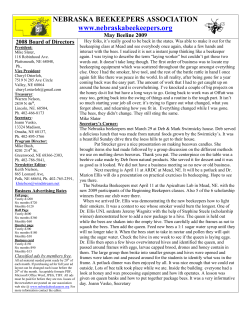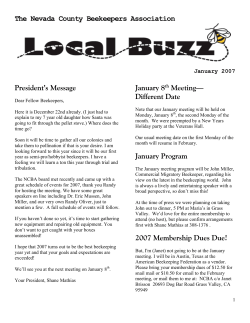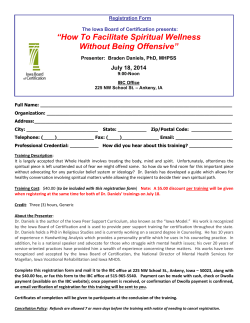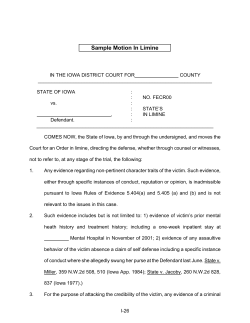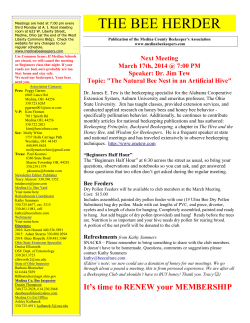
The Buzz Newsletter of the Iowa Honey Producers Association
The Buzz Newsletter of the Iowa Honey Producers Association October 2014 Iowa Honey Queen pg3 Annual Meeting Information pg8-11 Buzz Quilts! pg12 www.ABuzzAboutBees.com November 14th-15th—IHPA Annual Meeting—Marshalltown, IA For Sale: Medium and Deep boxes with frames (no foundations) $35.00 each. Also have Bottoms, Lids, and other misc. for sale. Also have Top Bars at 30 bars large, very nice, $375. Wanted: 55 gal drums in good condition for honey. Andrew Jenkins Tipton, Iowa Call 563-889-2632 For sale: Bees in 9 5/8 in 10 frame hive body with 9 frames. For Sale: 4 drums of honey. Also several buckets @ $2.10/lb. Contact Jeremy Van Donselaar Cedar, Iowa, 641-672-9598 or jkctlbl7@hotmail.com For Sale: 8 beehives reconditioned; some new parts, 90% complete, new paint, state inspected. 3 bee smokers 1 honey extractor Call Dave at 319-331-6590 FOR SALE: Beekeeping Equipment and supplies - Goodell IA Offering reasonably priced new and some used beekeeping supplies and equipment. For more information, please call Pat @ 515-293-2601 Call Curtis at 319 480-2915 $130.00 each. Call Curtis at 319 480-4209 FOR SALE: screen bottom boards, telescopic covers and 1 gallon frame feeders. For pricing on used equipment, call 641-477-8521. FOR SALE: Bee Blower with new hoses. Same as shown in Dadant catalog page (M00780 - MRP $529), has Tecumseh engine. $225. Call: 641-477-8521. Explore Honeybees! I am writing a book for kids titled Explore Honeybees. The finished product will be 96 pages long and include 25 activities to help kids understand more about honeybees. The book will be sold nationwide with a strong push in the educational market. Nomad Press, the publisher, is looking for the names and email addresses of people to preview the book and provide a short review or quote that could be used on the back cover. If you are an educator or work with kids, even better. I estimate the edited manuscript with art will be available for review some time this winter. It would be sent electronically. I do not personally select the previewers, I only send a list to the publisher and they make the contacts. If are interested or want more information about this book or my previous books, please contact me. Annual Meeting Contest Judges Cindy Blobaum cindybb@juno.com If you are interested in being a judge (wife of beekeeper and IHPA member or helping out at the annual meeting Philip). in Marshalltown on November 14 & 15 , please contact Eli for more deFor sale: Plastic uncapping tank, com- tails. plete with honey gate and pivot bar $85. Contact fieldstonefarms@netins.net. FOR SALE: 1 yr old Dadant Water Jacketed Mini Melter for $800. Tel 641-512-4728 or email fieldstonefarmsbiz@gmail.com. Look forward to hearing from you. Eli IHPA vp Call: 641-477-8521. The Buzz Newsletter Article Submissions Please send submissions, classified ads, and photos to Alex` Ebert by email to TheBuzz@ABuzzAboutBees.com (also alex.ebert@eberthoney.com) or by mail to The Buzz, c/o Phil Ebert, 14808 S. 102nd Ave. E., Lynnville, IA 50153. The deadline for submissions is the 10th of each month to be included in the following month’s newsletter. The Buzz is a monthly newsletter published by the Iowa Honey Producers Association which is an affiliate of the Iowa State Horticultural Society. 2 Iowa Honey Queen Hello Everyone! The Iowa State Fair is over for the year, and I had a wonderful time attending it. While at the fair, I gave presentations, cooking demonstrations, and hosted kid’s activities. I was also interviewed on various radio stations, and appeared on TV several times! It was an exciting experience I won’t ever forget, and I’m going to use this article to tell you all about my highlights from each day I spent at the fair. August 6th I was a judge in the Foods Made With Honey competition. It was my first time being a judge, and the morning of the 6th I had a crash course on the finer points of judging food. The competition was based off taste, presentation, texture, and use of honey. Before the judging began, I was incredibly nervous I wouldn’t know what to do. It didn’t help that judging took place in front of many of the people who entered the foods. However, I quickly adapted to the environment, and in the end I had a great time. That night, the IHPA entered a float in the State Fair Parade. The float, which was designed by the marvelous Julie Swett, won first place as the Most Creative Commercial Float. It was even shown on television. August 7th was the official first day of the fair. In the morning, I met up with Bill Northey, the Iowa Secretary of Agriculture. He loved the honey lemonade served at the IHPA booth. If you’ve never had honey lemonade, you’re missing out. I admittedly drank about 5 to 6 glasses of the tasty treat every day. August 8th I learned how to run the Honey Lemonade cash register. I also spent more time with Ciera and Starlette, my two short, teenage body guards who guided me around the fair. I became a professional candle roller on August 9th. Candle rolling is a fundraiser for the Iowa Honey Queen Program. Fair goers can pay a dollar to roll a sheet of wax and a wick into their very own candle. Kids and adults alike love the activity. August 10th was all about presentations. Throughout the entire fair, I gave a daily presentation in the Animal Learning Center. It was a lot of fun to get up on stage and educate the public. Afterwards, I had a question and answer session, followed by photos with the public. In those moments I felt like a true celebrity. 3 August 11th I put temporary IHPA bee tattoos on everyone who would let me. I would conservatively guess I applied several hundred tattoos over the course of the fair. In addition, I had the opportunity to take a photo with my favorite childhood cartoon character, Arthur. I presented a cooking demonstration on August 12th. I made no-bake energy bites in front of an audience, and they all had the opportunity to sample the delicious treat. For each demonstration, I had a kid from the audience come up and help me out. They loved being involved. I spoke on the Van and Bonnie show on August 14th. While on the air, we discussed the IHPA’s booth at the fair and ways citizens can help take care of the honeybee population. The same day, I talked on STAR 102.5 about the importance of honeybees to our food supply. August 13th I enjoyed meeting people outside the Agriculture building. I also had the pleasure of spending some time with Jeralyn Westercamp, the Iowa August 15th was very similar to my other days because I Honey Princess, when she gave presentations, rolled candles, and sold lemonade. Howstopped by the fair for a ever, it was different because I met a very young princess couple hours. who was thrilled to meet a queen. I always love taking pictures with kids, and this little girl was all smiles. 4 Newsletter The Kid and Bee expo was held on August 16th. I presented fun facts, taught kids how to make seed bombs, and posed for pictures. In addition, the IHPA set up a bean bag toss game, provided coloring sheets, and took turns wearing the bee costume. Have you moved? Are you getting ready to move? Will you be a snow bird this winter by going somewhere warm? If you answered yes to any of these questions, please contact Rhonda Heston to give her your new address or when you will be back to the address on file. When the Buzz Newsletter is mailed from the printer, the association pays bulk rate postage. If a newsletter is returned to Rhonda for a bad address or temporarily away, the association pays $.70 per newsletter. When the newsletter is mailed to the corrected address, we pay an additional $.70 in postage. Currently there are three members that we cannot send the Buzz out to because of the address and we don’t have a phone number to call. Douglas Mencl, Bobbi Finarty and Brad Jacobs please contact Rhonda with your correct address. R.Heston@yahoo.com or 515-724-2124. Please help keep our membership list current. Thank you. August 17th I had to say goodbye to everyone I spent the week with. I was very sad because I had grown close to many people I now miss. I’d like to take a moment to thank everyone who supported and cared for me throughout the fair. Pat Ennis, Heidi Godwin, Steve and Rhonda Heston, and my fair mom, Connie Bronnenberg were constantly around to guide me. The fair would not have been the same without them. I would also like to thank all the other volunteers who worked at the IHPA’s booth. It is amazing how smoothly the whole process runs with all the yellow-shirted people working together. If you didn’t get the chance to help out this year, I encourage you to sign up for a shift in 2015. I know I’ll be going back for more! This year, I found out for myself it is true “Nothing Compares” to the Iowa State Fair. I had a wonderful time representing the IHPA, and I look forward to working at the booth in the years to come. Best wishes to all of you, Gabrielle Hemesath Jeralyn Westercamp promoting Iowa Honey in Paris, France in August 2014 5 New cash registers At the State Fair our existing cash registers were replaced with registers that had scanners attached and accepted credit cards on the registers. The registers seemed to make the checkout process easier this year. There were a few hiccups at first, but that happens when processes change. IHPA Awards If you know of somebody the IHPA should recognize please contact Curt Bronnenberg at (515) 465-5939. A brief written description of the nominees involvement in beekeeping/ IHPA would be appreciated. These awards are given out during the Annual Meeting so please send in your nominees as soon as possible. Life Time Membership Award Pioneer Award for having been involved in beekeeping for 50 years or more and still active in beekeeping. Distinguished Service Award for assisting other beekeepers, willing to share information, and\or serving the state association. Education Award for teaching beekeeping classes, speaking at service clubs, giving presentations to school children or speaking about beekeeping on radio or T.V. Promotions Award for promoting honey and beekeeping, promotions for the state association or promoting their own product. Friendship Award for being a friend of the association. This could be someone who has displayed at the annual IHPA trade show, a state official who has assisted or encouraged beekeeping. They do not need to be a of our beekeeping community. Youth Award for a youth person who has shown commendable involvement in such things as helping at the state or county fair, successfully keeping bees for at least one season including wintering, writing, making a float for a parade, speaking, etc. 6 Comments from our volunteers were positive. If you have any suggestions to improve the process, please contact Rhonda Heston at R.Heston@yahoo.com or 515-245-6123. WORKING FOR BEEKEEPERSS! Glen L. Stanley, President, Apiary Inspectors Of America, emeritus, Huxley, Iowa 50124. As it becomes common knowledge that I recently had an opportunity to contact the Bayer, bee Research Organization in North Carolina with information about the bee losses throughout the Midwest , most beekeepers will feel I am against beekeepers. Quite the opposite is the case and people in industry from coast to coast, border to border know that all these years I have always worked to better beekeeping. As you examine the situation closely it becomes evident most the loss is from starvation.The extensive losses of colonies during the Winter months is common knowledge and the Scientists at the Bayer Research are adding that knowledge with whatever else they may develop. That Research Center has many Scientists and hundreds of employees. They are researching many products. The Commissioner of Agriculture in N. Carolina is behind their effort as he recognizes the importance of bees to agriculture. That is a plus to the entire situation which few states have. All the Scientists in the world cannot change what is happening in the Midwest , only beekeepers can fix it. Honeybees Endure the Sting of Colony Collapse Disorder posted on September 17, 2014 The western honeybee is the world’s premier managed species of pollinators. More than 100 crops are highly dependent on the insects, and bee pollination’s value to the U.S. agricultural industry is valued $15 billion annually. Between 1947 and 2005, the number of bee colonies in the United States declined more than 40 percent. The plunge accelerated in the 1980s, when parasitic mites were accidentally brought into America. But in Iowa, apiarists have been busy as the bees themselves trying to protect the essential labor force. David Miller explains. It’s early spring and nearly 60 people have gathered for the Central Iowa Honey Producers’ annual auction. The sale, with its reconditioned and speciallymade wares – caters to small-scale beekeepers that own or work with just a few colonies of honeybees. The exchange of tools of the trade carries on for a few hours but the more pressing matter for these apiarists is the battle to restore the U.S. honeybee population. They are in a fight to stop what is commonly called colony collapse disorder or CCD. Arvinn Foell, president of the Central Iowa Honey Producers Association, considers himself to be on the front lines. Arvin Foell - Kelly, Iowa, Central Iowa Honey Producers Association: “Colony collapse; there's no magic bullet. All beekeepers are looking for a magic bullet but I'm afraid it's not there. I think beekeepers have to be very contentious about their job and watch their bees. And that's what we're gonna have to do. We're just gonna have to be more proactive with that.".” While experts believe there’s no single cause for CCD, they do say it’s a combination of harsh weather, deadly disease, toxic chemicals and a parasite known as the Varroa Mite. of commercial honeybee colonies poses a threat to the economic stability of commercial beekeeping and pollination operations in the United States, which could have profound implications for agriculture and food.” onies. The Varroa Mite, a parasite that In Iowa, for instance, the coldest winter in 35 years decimated honeybee populations in 2013. State officials estimate between 60 and 65 percent of the state’s honeybees didn’t survive. Because some of the bees were unable to get enough food– what humans prefer to call honey – they simply starved. According to some scientists, pesticides and other chemicals also have done considerable damage to bee colonies. Jason Foley, an urban beekeeper, raises Russian queen bees for sale to hobbyists and professional producers. Foley believes one way to help reduce the effects of CCD is proper placement of the hives. Jason Foley, Des Moines, Iowa: “Year one: the bees come back with pollen that builds up a concentration in the wax. Year two: that wax gets more concentrated. Year three, four, five, etc. 'til it gets to a tipping point that these young bees are being raised in wax that is just saturated with these systemic pesticides. And the systemics affect the bees nervous system and that's the main thing with the neonicatoids with the honeybee. The nervous system is affected in a way that when it hits that tipping point they have a hard time navigating back to the hive and they get lost.” Honeybees also must battle various mites that threaten to destroy entire col- attaches itself to bees and infiltrates their hives, can devastate bee populations in a few short months. The combined effect has been a decline in honeybee populations of up to 50 percent annually in some regions. That’s a major concern for Iowa beekeepers and it’s even drawn the attention of the White House. In June, President Obama called for a federal strategy to promote the health of honeybees and other pollinators. The Agriculture Department has made $8 million available to farmers and ranchers in five states to establish new and improved honeybee habitats. In a proclamation, Obama cited USDA data indicating that, “Honeybee pollination alone adds more than $15 billion in value to agricultural crops each year in the United States.” “The continued loss New federal guidelines notwithstanding, work has already begun at Spring Valley Honey Farms in Iowa. Besides selling raw honey by the 55-gallon drum, as well as products like beeswax candles and creamed honey, the 3-decade old operation supports 3,600 honeybee colonies and is selling bees to help resupply those who are in the fight against CCD shop. Pat Ennis, Spring Valley Honey Farms: “Basically with the winter die-off here in Iowa, a lot of beekeepers need new bees, there's not enough beekeepers here in Iowa to produce all these. There's probably six or seven producers in Iowa that sell packaged bees to the hobbyist beekeeper so they can get new bees to start out the next year.” Spring Valley also does a brisk business renting its hives to fruit and nut tree producers. After helping pollinate Iowa’s orchards in the summer, the bees are shipped to the west coast for winter work on California’s $4 billion almond crop. But without conservation efforts taken on the front lines by keepers like Foell, Foley, Ennis and other apiarists around the country, bee populations will likely continue to decline due to parasites, pesticides and other perils. For Market to Market, I’m David Miller. —Thanks to Arvin and Jeanne Foell for letting us know about the article. 7 Entry information for the photo contest, cooking with honey contest, mead contest, and hive body paint design contest are printed on page 10. 8 9 Full agenda showing times is planned to be printed in the November Buzz Newsletter, which can be viewed sooner by visiting www.abuzzaboutbees.com Any questions please contact Eli Kalke at fieldstonefarmsbiz@gmail.com or 641-512-4728. 10 We have launched our Sentinel Hive program, but we need your help in spreading the word. The vanEngelsdorp bee research lab was selected by the U Sentinel Hives monitor honey bee health of Maryland’s crowdfunding program in real-time using hive scales, monthly LAUNCH. Our goal is to raise $10,000 disease assessments, and pollen traps to by Oct. 22 to fund a pilot program of 10 determine available plant forage. The Sentinel Hives with pollen and disease scale data is automatically transmitted to monitoring. Money raised above our the Bee Informed Partnership (BIP) da- goal will fund extra Sentinel Hives. tabase and the patterns of nectar flow mapped. Our UMD diagnostic team Any $2,000 donation receives a talk by turns around the varroa mite and disease Dr. Dennis vanEngelsdorp to your analysis quickly, so that beekeepers can group. He will travel out-of-state, so take action. The goal of the Sentinel long as his travel expenses are covered. Hives is that they become early warning Or if your club would like to be includsystems. We can then alert beekeepers ed in the Sentinel Hive program, a of potential problems due to increases in $2,000 donation will fund a dual hive disease or lack of nutritional resystem and two years of monitoring. sources. The campaign page includes a video that explains our project in greater Bee Culture Magazine and The Medina detail: County Beekeepers are kicking in https://www.launch.umd.edu/honeybees $2,000.00. Now's your chance to get University of Maryland kicks off Sentinel Hive project! Donate TODAY! involved. Check out the web page and make a donation today. Courtesy of Kim Flottum/Bee Culture magazine 11 Buzz Quilts Please contact Rhonda Heston 515-724-2124 The 2014 Buzz Quilts have been completed. If you worked at the Iowa State Fair, you might have noticed the Quilts as part of the Booth décor. With two quilts this year, the plan is to raffle one quilt and put one in the live auction at the Annual Meeting in Marshalltown on Friday, November 14th. Raffle tickets will be $5 each or 5 for $20 again this year. Buzz Quilt #1 will be auctioned on Friday night. The Raffle winner of Buzz Quilt #2 will be drawn at the close of the Annual Meeting on Saturday, November 15th. 12 EUROPEAN BEES OVERWINTERING LOSSES OF COLONIES SINK TO RECORD LOW (Don't miss reading these important reports, URLs given in the article) European bees are much healthier than many recent publications appear to suggest. New field data from nearly 400,000 bee colonies from 21 countries in Europe and the Mediterranean show that overwintering losses of honey bee colonies – a leading indicator of general bee health – are at their lowest level in years. The non-profit honey bee research association COLOSS (prevention of honey bee COlony LOSSes - http://www.coloss.org), which comprises more than 360 scientific professionals from 60 countries, has published new data (www.coloss.org/announcements/losses-ofhoney-bee-colonies-over-the-2013-14-winter) showing that the overall mortality rate of bees in the 2013/2014 winter was nine percent – in Europe, losses below 10 percent are considered to be normal*. This compares with losses between 30 and 34 percent in the UK and Belgium during the 2012/2013 winter season. Mite infestations impact overwintering In winter, honey bees are generally not active outside the hive; they are very busy inside taking steps to ensure the colony's survival. They continue to access stored food – honey and pollen – and generate heat within the hive to protect the queen. If adequate provisions have not been made during the summer and fall, e.g. by the bee keeper, then a colony is likely to collapse by the following spring because of starvation. Another major factor affecting honey bee colonies in the winter is mite infestation – the greatest threat is from the Varroa mite. The coordinator of the COLOSS Working Group, Dr Romée van der Zee from the Dutch Centre for Bee Research, explains, “The contributions of many factors which are correlated to colony losses seem to be very dependent on weather conditions. Colonies built their brood nests late because of the relatively cold spring in 2013. This may have decreased the number of reproductive cycles of the parasitic Varroa mite, producing fewer mites. Good weather in the summer then provided excellent foraging opportunities.” Neonicotinoids do not cause harm to bee health in farming practice Restrictions on neonicotinoids came into force in Europe in December 2013 as a result of the European Commission´s concerns that this group of crop protection products, which is used to control pests that damage field crops such as corn and oilseed rape, might pose a risk to bees. Many scientific studies, field monitoring data and risk assessments, however, have shown neonicotinoids do not cause harm to bees under real-life field conditions when they are used responsibly and properly, according to label instructions. “It seems that everyone is looking for just one culprit of reduced bee health and colony losses, but you can't point the finger of blame at a single factor. Bees are facing multiple challenges around pests and pathogens, loss of habitat, and poor farming and beekeeping practices. Pollination matters to agriculture, hence safe- guarding the health of bees is a shared responsibility of all the partners involved: farmers, beekeepers and industry,” says Annette Schürmann, Head of the Bayer Bee Care Center in Monnheim, Germany. This is underscored by a landmark study published in May 2014 in the Proceedings of the Royal Society (http://rspb.royalsocietypublishing.org/ content/281/1786/20140558.full). A group of international scientists led by Professor Charles Godfray and Professor Angela McLean, University of Oxford, analyzed the natural science evidence base relevant to neonicotinoid insecticides and insect pollinators. They concluded that "there is poor geographical correlation between neonicotinoid use and honeybee decline". Australia and New Zealand: bee industry in good shape This is supported by findings outside Europe. A parliamentary report (http://www.parliament.nz/resource/ennz/50DBSCH_SCR56864_1/34a0a5f2526c4db 590c2b0330083d8af2313b150) on bee health published by the Primary Production Committee in New Zealand in July 2014 confirms, “There is currently no evidence of the disorder [Colony Collapse] in New Zealand, although these pesticides [neonicotinoids] are commonly used here as a seed dressing and as foliar sprays. We heard that when anecdotal evidence of losses is investigated, the causes seem to be mainly Varroa or starvation rather than pesticides.” The report notes that honey production and exports are rising. The regulatory authorities in Australia also investigated the potential effect of neonicotinoid seed treatments on bee health. Their report “Neonicotinoids and the health of honey bees in Australia,” (http:// archive.apvma.gov.au/news_media/chemicals/ bee_and_neonicotinoids.php) published in March 2014, confirms that the introduction of the neonicotinoids in Australia has brought a number of benefits such as healthy crops and more productivity, noting also that they are considerably more favorable for humans (and other mammals) than the older products they have replaced. *Historical losses in the U.S. range between 10 - 15 percent. According to the USDA report released in May of this year, overwintering losses in the U.S. also improved significantly compared to previous years. 13 14 15 The Buzz Newsletter Iowa Honey Producers Association 52735 187th Avenue Chariton, IA 50049 Officers District Directors President: Pat Ennis 2105 110th St. Goodell, IA 50439 (641) 444-4767 Flat_Lander@lycos.com District #1 Jackie Beard 19682 415th St. Chariton, IA 50049 (641) 774-8047 BeardRJ@wildblue.net Vice President: Eli Kalke 1445 165th St. Clemons, IA 50051 (641) 512-4728 fieldstonefarmsbiz@gmail.com District #2 Louise Johnson 34147 310th St. Guttenberg, IA 52052 (563) 252-2340 LouiseJ@alpinecom.net Secretary: Renae M. Beard 116 15th Street Cedar Falls, Iowa 50613 (515) 650-0655 District #3 Dennis Nielson 6948 25th Ave. Newhall, IA 52315-9620 (319) 350-8361 dlnielson35@gmail.com Treasurer: Rhonda Heston 52735 187th Avenue Chariton, IA 50049 (515) 724-2124 R.Heston@yahoo.com District #4 Mike Swett 2005 North Dakota Ave Ames, IA 50014 (515) 450-2033 funcity@aol.com Historian: Butch Wetzel 8227 NE 38th Ave Altoona, IA 50009 (515) 979-6322 thewetzelclan@aol.com District #5 Craig Greene 1554 135th PL Knoxville, IA 50138 (641) 842-2112 cgreene@iowatelecom.net Past President : Curt Bronnenberg 14405 Hull Ave. Perry, IA 50220 (515) 465-5939 CBronny823@aol.com District #6 Mike Divis 3312 210th St. Anthon, IA 51004 (712) 373-9743 (712) 899-8117 mikyyyd@aol.com Back-to-Basics Beekeeping Club Contact: Jim & Tina Marshall Marsh Hill 2923 Jones Ave Oskaloosa, IA 52577 (641)-660-0983 marshalljt@wildblue.net Friendly Beekeepers of Iowa Contact: Judy Spence 12839 Carpenter Trail Carlisle, IA 50047 (515) 988-8397 jespencejr44@gmail.com Central Iowa Beekeepers Association Contact Arvin Foell 30930 530th Ave. Kelley, IA 50134 Home phone 515/597-3060 Cell phone 515/450-9494 ajfoell@huxcomm.net Great River Bend Beekeepers Contact: David Hayes 1749 110th St. Maquoketa, Iowa 52060 563-678-2862 prairiecreekfrm@netins.net Des Moines Backyard Beekeepers Contact: Julia McGuire 515-988-1828 jcammcguire@yahoo.com Loess Hills Beekeeping Association 22524 Hunt Avenue Council Bluffs, IA 51503-7978 LHBA@LoessHillsBA.com East Central Iowa Beekeepers Contact: Dave Irvin 2254 S. Riverside Dr. Iowa City, IA 52246 (319) 351-6205 North Iowa Bee Club Contact: Pat Ennis 1040 Union Ave. Goodell, IA 50439 (641) 444-4767 Flat_Lander@lycos.com State Apiarist Andrew Joseph (515) 725-1481 andrew.joseph@iowaagriculture.gov IDALS website www.agriculture.state.ia.us Iowa Department of Inspections and Appeals Mark Speltz (515) 669-3266 mark.speltz@dia.iowa.gov Iowa Honey Queen Program Connie Bronnenberg 515-480-6076 cbronny823@aol.com Northeast Iowa Beekeepers Contact: Louise Johnson 34147 310th St. Guttenberg, IA 52052 (563) 252-2340 LouiseJ@alpinecom.net Southwest Iowa Honey Producers Contact: Mike & Donna Brahms 14922 535th Street Griswold, IA 51535 (712) 778-4256 Northwest Iowa Beekeepers Contact: Larry J. Boernsen 6724 200th St. Ocheyedan, Iowa 51354 (712) 735-4205 Lm5kbees@iowatelecom.net Red Rock Beekeepers Contact: Gerald Murphy 1180 92nd Ave Knoxville, IA 50138 (641) 218– 4814 Southeast Iowa Beekeepers Contact: Vernie Ramsey 22781 Route J16 Birmingham, IA 52535 (319) 498-4355 Vdramsey@netins.net Bee Emergency Information Contact: Vern Ramsey 22781 Route J16 Birmingham, IA 52535-8162 (319) 498-4355 Contact: Mike Divis 3312 210th St. Anthon, IA 51004 (712) 373-9743 (712) 899-8117 American Honey Producers Association www.ahpanet.com American Beekeeping Federation www.ABFnet.org National Honey Board www.honey.com Amy Toth, Assistant Professor Iowa State University Ecology, Evolution, and Organismal Biology amytoth@iastate.edu www.public.iastate.edu/~amytoth/ Toth_lab/Home.html
© Copyright 2025

